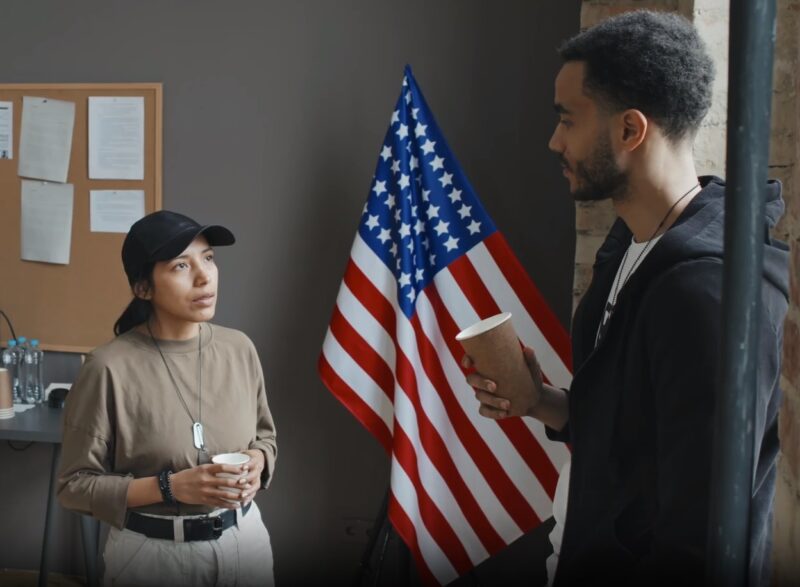Democracy is often described as “of the people, by the people, for the people,”.
In the United States, a country with a rich democratic tradition, the power of individual participation is not only about voting.
Beyond the ballot box, there is a spectrum of ways through which citizens can be actively involved.
Civic Engagement
While voting represents the basis of democratic participation, there are other aspects where people can contribute and influence policy decisions.
Civic engagement, a broader concept, is the core of everything. It’s all about doing things that help make decisions in our town or country.
Community Involvement
Democracy starts right in our neighborhood. When we join in on local events, go to meetings, and be part of groups in our area, we can make a difference in the things that happen around us.
When we all start doing our bit in our backyards, it can encourage more people to step up. It can start a chain reaction, bringing bigger changes. There’s a whole bunch of groups right where we live, all working on different things.
The only way to push for change at local, state, or national levels is by being active.
Advocacy and Lobbying
Direct Participation and Influence:
- Citizens have the power to influence elected officials and decision-makers.
- Advocacy for specific policies or causes can be done individually or within larger groups.
- It’s crucial to not only demand change but also offer solutions.
Engaging with Elected Officials:
- Every elected official represents a specific electoral district.
- Reaching out to representatives.
- Organizing or attending meetings.
- Hosting events to discuss concerns directly.
Digital Participation in Modern Times

Through online platforms, people can connect, campaign, and even crowdsource solutions, building a more inclusive, digital democracy.
Online Petitions and Campaigns
Websites and platforms dedicated to petitions offer a way for people to rally behind causes they care about.
Thanks to social media, a movement, and its ideas can spread fast and get noticed by the people making the big decisions.
While one person’s voice might seem small, the combined power of many can lead to results.
Participating in Online Forums and Discussions
Platforms such as social media sites, blogs, and community forums have become modern town halls.
By participating in discussions, sharing insights, and debating solutions, people can contribute to the national conversation on various issues.
The internet provides a wealth of information on almost any topic.
Educational Initiatives and Democracy

The backbone of democracy is an informed citizenry.
By actively participating in educational initiatives, we all can better understand the complexity of our nation’s governance and help build a more informed community.
The one where all are satisfied, both the elected leads and the people(including the opposing side).
| Workshops | Provide insights into civic responsibilities and roles in democracy | Community centers, Universities, Nonprofit organizations | Encourage dialogue and clarity on complex issues |
| Seminars | Offer a deep dive into constitutional rights and government operations | Community centers, Universities, Nonprofit organizations | Foster informed participation in democracy |
| Lectures | Educate on the inner workings of government and democratic principles | Community centers, Universities, Nonprofit organizations | Enhance understanding of democratic processes |
| Seminars (for young audiences) | Aimed specifically at younger citizens to instill democratic values early on | Community centers, Universities, Nonprofit organizations | Lay the foundation for an engaged future generation, ensuring the longevity and health of the nation’s democratic system |
Promoting Critical Thinking in Schools
Schools can teach kids to think for themselves, to ask questions, and figure things out.
When they learn to be open-minded and understand others, they grow up to be smart and active members of society.
Group projects and debates in school can mimic real-world democratic processes.
This can help students fully understand the importance of different viewpoints and also teach them the value of collaboration and compromise.
Engaging in Volunteer Activities

Giving back to the community, whether through time, skills, or resources, is another aspect of active democratic participation.
Volunteer activities, though they may seem unrelated to governance, play an important role in improving community bonds and leading to collective responsibility.
Volunteering for community services like clean-up drives, food banks, or tutoring programs allows us to contribute directly to the progress of our communities.
Engaging in different volunteer activities exposes individuals to diverse groups and perspectives. NGOs often work on issues at the grassroots level, addressing challenges and pushing for reforms.
Many NGOs require specialized skills, from legal expertise to graphic design.
Media Literacy and Democracy

It’s simple to understand that media is more important than ever.
It is crucial to keep media open and free to all.
Besides that, the next part is to help people understand that there is no reason to ever stick to one source.
The internet is an endless well of information(but not all information there is true or relevant!)
| Media’s Role | Every piece of media, from news articles to social media posts, carries a distinct message. Recognizing the nuances, biases, and objectives behind these messages allows for better-informed decisions on public issues. |
| Informed Audience | An audience should not just consume media but engage with it responsibly. Understanding the impact of sharing and promoting content is crucial to avoid propagating misinformation or biased narratives. |
| Educational Integration | Schools and universities can emphasize media literacy within their curricula. This fosters critical thinking, especially regarding content consumption. Workshops teaching discernment of fact from fiction in the digital space are essential. |
| Community Involvement | Local communities have the opportunity to host media literacy workshops and seminars for all age groups. Such initiatives bridge generational gaps and ensure that all are equipped to navigate the ever-evolving media landscape. |
Engaging in Public Protests and Movements

Peaceful protests and movements are integral components of a functioning democracy.
They allow citizens to speak up about their concerns, demand change, and draw attention to issues that might be overlooked by mainstream channels.
The Power of Collective Voice
Peaceful protests, whether they’re large-scale marches or local gatherings, amplify the collective voice of the citizenry.
Unfortunately, sometimes protests are the only way for officials to consider you, your group, and what you are trying to highlight.
Supporting a cause from afar has become easier.
Sharing information, donating to relevant organizations, or even voicing support online can have a significant impact.
Financial Contributions to Democratic Processes

Financial contributions, whether big or small, play a significant role in shaping the democratic landscape.
By directing funds towards causes, campaigns, or organizations that align with one’s beliefs, individuals can influence the trajectory of democratic processes and ensure that certain issues receive adequate attention.
Supporting Political Campaigns
Many political campaigns, especially those at the local level or those championing underrepresented causes, rely heavily on small donations from individuals.
Contributing financially can help these campaigns gain traction, allowing them to compete effectively and amplify their messages.
While supporting campaigns, donors need to research and understand where their money is going.
Backing Civic Organizations and NGOs
Numerous civic organizations and NGOs work diligently to uphold democratic values, educate citizens, and push for reforms.
Financial support can aid these organizations in expanding their reach, conducting research, and implementing programs that bolster democratic participation.
Just as with political campaigns, it’s crucial to ensure that the organizations one supports are transparent, credible, and genuinely committed to the cause.
Engaging in Policy and Legislation

Elected officials often draft and pass legislation, citizens have a role to play in shaping these policies.
Participating in Public Comment Periods
Many governmental bodies, from local councils to federal agencies, have public comment periods for proposed regulations or policies.
By submitting feedback, concerns, or suggestions during these periods, citizens can directly influence the final form of these regulations.
Collaborative Policy Drafting
In certain states and localities, citizens can propose new laws or changes to existing ones by gathering signatures for petitions.
If these petitions meet specific criteria, they can be put up for public vote, allowing direct democracy in action.
For those with expertise in specific fields, collaborating with lawmakers to draft policy can be a proactive way to ensure that legislation is both effective and grounded in factual knowledge.
FAQs

